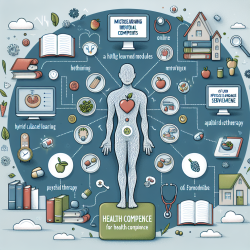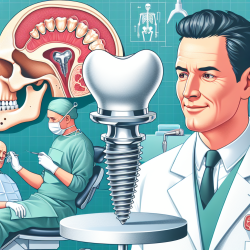Introduction
In the ever-evolving field of health and education, the integration of technology has become a pivotal factor in enhancing outcomes. A recent study titled Microlearning mApp raises health competence: hybrid service design sheds light on how microlearning applications can significantly improve health competence. This blog will explore how practitioners can leverage these findings to enhance their skills and encourage further research.
Understanding Microlearning and Its Impact
Microlearning refers to a method of delivering educational content in small, manageable segments, often through digital platforms. The study conducted by Simons et al. (2015) investigated the efficacy of a mobile microlearning health quiz integrated within a hybrid service design, combining electronic and physical support services.
The research demonstrated that this approach not only improved health readiness and competence but also sustained positive health behaviors over a 10-month period. The microlearning health quiz provided new and relevant information, leading to high utilization rates and significant improvements in health self-management competence.
Key Findings and Implications for Practitioners
For practitioners in the field of speech-language pathology and beyond, the study's findings offer valuable insights:
- Increased Health Competence: The microlearning approach enhanced users' health perceptions, everyday choices, and coping strategies, contributing to long-term health behavior improvements.
- Effective Integration: The mobile health quiz was effectively integrated into the overall service mix, providing positive triggers and low barriers to use, such as ease of use and limited time burdens.
- Long-term Behavior Change: Participants reported sustained improvements in health awareness, motivation, and behaviors, including physical activity, dietary choices, and mental recuperation.
These findings suggest that practitioners can enhance their service delivery by incorporating microlearning strategies into their practice. By doing so, they can provide clients with engaging, accessible, and effective tools to support health and well-being.
Encouraging Further Research
While the study provides compelling evidence for the benefits of microlearning in health interventions, further research is needed to explore its potential across different contexts and populations. Practitioners are encouraged to investigate how microlearning can be tailored to meet the specific needs of their clients and to contribute to the growing body of evidence supporting this innovative approach.
Conclusion
The integration of microlearning applications within a hybrid service design offers a promising avenue for enhancing health competence and achieving long-term behavior change. Practitioners in speech-language pathology and related fields can leverage these insights to improve their practice and outcomes for their clients.
To read the original research paper, please follow this link: Microlearning mApp raises health competence: hybrid service design.










